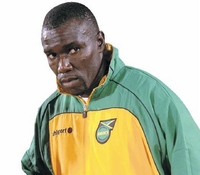
Whitmore
THEODORE WHITMORE, the coach of Jamaica's senior national football team, the Reggae Boyz, was upbeat as he faced the media last Tuesday following a 0-0 draw against South Africa at the Free State Stadium in that country.
"I'm very happy with the 0-0 draw. That's good for us," Whitmore told journalists after a Jamaican team ranked 69th by FIFA was outplayed by the South Africans who are ranked 16 places lower.
But even if Whitmore was happy with the draw, he could not be happy with the headlines, 'Boyz, SA in dreary draw' reported The Gleaner's Audley Boyd. 'Drab Draw' reported another daily, and it was the same around the world.
More bad news was to follow on Friday when FIFA released its latest ranking which saw Jamaica drop five places to 74th, a shade above the rank where European clubs would no longer offer work permits to players.
It was a far cry from the heady days in 1996 when the Reggae Boyz won the FIFA Mover of the Year award for the climb up the ranking ladder, or in 1998 when the team became the first from the English-speaking Caribbean to qualify for the finals of football's World Cup.
steady decline
Since then, the country's football has been in steady decline to the point where we can be content, if not happy, for a draw with a team 16 ranking places lower and which has qualified for the World Cup final only because it is the host nation.
But that is a symptom of what has happened to Jamaica's football in the two decades since France '98.
Several personnel changes have taken place at the leadership of the Jamaica Football Federation, inter-national coaches have come and gone, and sponsors have pumped millions of dollars into the game.
However, that has done nothing to improve the quality of the sport locally, and the administrators must take all the blame.
The nation's top competition, the Digicel Premier League, resembles a kick-about, with many teams playing without form, substance or style.
There is still the exciting game and the one or two moments of brilliance, but all in all, the quality of the competition has gone down many notches since '98.
The schoolboy matches are no better, with the increase in the number of participating schools not being reflected in the quality of the football.
Our schoolboys continue to play on some fields that should be reserved for cows and goats, and those with natural talent at that level are not coming through with any regularity.
The apologists will point to the number of Jamaican footballers plying their trade overseas as a sign of the develop-ment, but since that is not being reflected in the quality of our national teams, the less said about that, the better.
Those apologists should tell the nation what are the programmes in place to take the 17- to 19-year-old youngster from schoolboy football to the next level, and what is in place to assist the clubs which are struggling to finance their participation in the lowest-level competition.
The truth is, the development plan at present appears to be: play schoolboy football, hope you get a scholarship to an American college or university where you excel, and wait on the call to play for the Reggae Boyz.
If that doesn't happen, then the next best bet is to look for one of the teams that markets its players - read Harbour View, Portmore and Tivoli - play for one of these teams and hope they get you a contract to play somewhere, anywhere in Europe, then wait on the call to play for the Reggae Boyz.
Something is really and truly wrong with the country's football, and the recent fiasco involving Tyrone Mears, who appeared for Jamaica in a friendly international even though he had absolutely no Jamaican connection, just underscores that.
It is impatient of debate that football and netball are Jamaica's national sports and those charged with their administration have a duty to the hundreds of youngsters who deserve a chance to achieve their full potential.
Until that happens, until they fix the fundamentals, the administrators of local football will remain among The Sunday Gleaner's People Under Pressure.